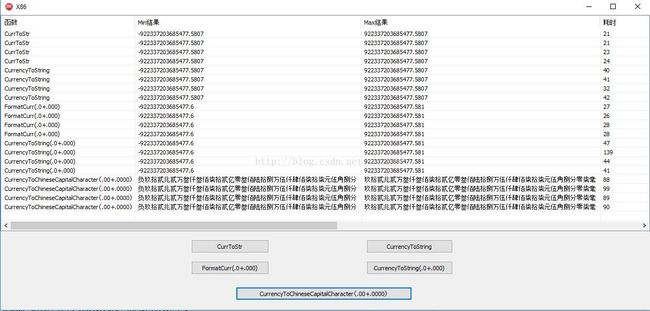Delphi货币类型转中文大写金额
在Delphi中,为了实现货币数值运算中的严格精度要求,内部把货币类型数据当作一个放大10000倍的64位整数来处理。这样根据64位整数的范围,可以得出货币类型Currency的范围是 [-922337203685477.5807; 922337203685477.5807]。
货币类型一个最常见的应用场景是金额大写转换,网上都是一些先将货币转字符串后再对字符串处理的代码,而且有些方法在有些情况下不满足金额大写规范,这里给出一个直接转换的方法。
unit TU2.Helper.Currency;
interface
function CurrencyToChineseCapitalCharacter(const AValue: Currency; const ADecimals: Cardinal=4): string;
function CurrencyToString(const AValue: Currency; const ADecimals: Cardinal=4): string;
implementation
uses System.SysUtils, System.Math;
function CurrencyRound(var U: UInt64; const ADecimals: Cardinal): Integer; inline;
var
W: UInt64;
begin//Bankers-rounding
Result := 4-ADecimals;
if Result<0 then
Result := 0
else if Result>0 then
begin
case Result of
1:begin //li
DivMod(U, 10, U, W);
if (W > 5) or ((W = 5) and Odd(U)) then
Inc(U);
end;
2:begin //fen
DivMod(U, 100, U, W);
if (W > 50) or ((W = 50) and Odd(U)) then
Inc(U);
end;
3:begin //jiao
DivMod(U, 1000, U, W);
if (W > 500) or ((W = 500) and Odd(U)) then
Inc(U);
end;
4:begin //yuan
DivMod(U, 10000, U, W);
if (W > 5000) or ((W = 5000) and Odd(U)) then
Inc(U);
end;
end;
end;
end;
function CurrencyToChineseCapitalCharacter(const AValue: Currency; const ADecimals: Cardinal=4): string;
const//Currency: [-922337203685477.5807, 922337203685477.5807]
CCCNegative = '负';
CCCZheng = '整';
CCCNumbers: array[0..9] of Char = ('零','壹','贰','叁','肆','伍','陆','柒','捌','玖');
CCCUnits: array[0..18] of Char = ('毫', '厘', '分', '角', '元','拾','佰','仟','万',
'拾','佰','仟','亿','拾','佰','仟','万','兆','拾');
var
U, W: UInt64;
Digits, Idx, ZeroFlag: Integer;
Negative: Boolean;
Buff: array[0..38] of Char;
begin
U := PUInt64(@AValue)^;
if U <> 0 then
begin
Negative := (U and $8000000000000000) <> 0;
if Negative then
U := not U + 1;
Digits := CurrencyRound(U, ADecimals);
if U<>0 then
begin
//Try skip trailing zero
repeat
DivMod(U, 10, U, W);
Inc(Digits);
until W<>0;
Dec(Digits);
Idx := 38;
if Digits>=3 then
begin
Buff[Idx] := CCCZheng;
Dec(Idx);
if Digits>4 then
begin
Buff[Idx] := CCCUnits[4];
Dec(Idx);
if Digits>17 then
begin
Buff[Idx] := CCCUnits[17];
Dec(Idx);
end else if Digits>12 then
begin
Buff[Idx] := CCCUnits[12];
Dec(Idx);
end else if Digits>8 then
begin
Buff[Idx] := CCCUnits[8];
Dec(Idx);
end;
end;
end;
Buff[Idx] := CCCUnits[Digits];
Dec(Idx);
Buff[Idx] := CCCNumbers[W];
Dec(Idx);
//Do Split
ZeroFlag := 0;
while U<>0 do
begin
Inc(Digits);
DivMod(U, 10, U, W);
if Digits in [4,8,12,17] then
begin
if ZeroFlag>0 then
begin
Buff[Idx] := CCCNumbers[0];
Dec(Idx);
end else if (ZeroFlag<0) and (Digits>8) then
Inc(Idx);
Buff[Idx] := CCCUnits[Digits];
Dec(Idx);
if W<>0 then
begin
Buff[Idx] := CCCNumbers[W];
Dec(Idx);
ZeroFlag := 0;
end else
ZeroFlag := -1;
end else begin
if W<>0 then
begin
if ZeroFlag>0 then
begin
Buff[Idx] := CCCNumbers[0];
Dec(Idx);
end;
Buff[Idx] := CCCUnits[Digits];
Dec(Idx);
Buff[Idx] := CCCNumbers[W];
Dec(Idx);
ZeroFlag := 0;
end else begin
if ZeroFlag=0 then
ZeroFlag := 1;
end;
end;
end;
if Negative then
Buff[Idx] := CCCNegative
else Inc(Idx);
//Copy Result
Digits := 38+1-idx;
SetLength(Result, Digits);
Move(Buff[idx], PChar(Result)^, Digits * SizeOf(WideChar));
Exit;
end;
end;
Result := CCCNumbers[0]+CCCUnits[4]+CCCZheng;
end;
function CurrencyToString(const AValue: Currency; const ADecimals: Cardinal=4): string;
const
NegativeChar = '-';
DecimalDotChar = '.';
var
U: UInt64;
Digits: Integer;
Negative: Boolean;
begin
U := PUInt64(@AValue)^;
Negative := (U and $8000000000000000) <> 0;
if Negative then
U := not U + 1;
Digits := CurrencyRound(U, ADecimals);
Result := UIntToStr(U);
if Digits<4 then
Result := Result.Insert(Result.Length+Digits-4, DecimalDotChar);
if Negative then
Result := NegativeChar + Result;
end;
end.对上面两个方法进行最大货币数值测试,并与自带货币转字符串方法比较。
64位结果如下:
32位结果如下:
注:耗时采用高精度计时器测量,应忽略突兀数值看平均值。
从对比上可以看出在64位程序下,这个方法性能要好于系统自带转换方法,而且其中文大写转换跟字符串转换性能一样。但在32位系统下,性能却差一点,这是因为这个方法主要采用了DivMod方法进行整除取余操作获取每位的数字,该方法在32位程序下,当被除数大于32位正整数时,其采用循环减10实现整除取余,这种情况下循环次数非常大。
附: 金额大写规范
一、人民币大写金额数字到“元”为止的,在“元”之后,应写“整”(或“正”)字;在“角”之后,可以不写“整”(或“正”)字;大写金额数字有“分”的,“分”后面不写“整”(或“正”)字。
二、阿拉伯数字小写金额数字中有“0”时,人民币大写应按照汉语语言规律。举例如下:
1. 阿拉伯金额数字中间有“0”时,人民币大写要写“零”字。如¥1409.50,应写成人民币陆壹仟肆佰零玖元伍角。
2. 阿拉伯金额数字中间连续有几个“0”时,人民币大写金额中间可以只写一个“零”字。如¥6007.14,应写成人民币陆仟零柒元壹角肆分。
3. 阿拉伯金额数字万位和元位是“0”;或者数字中间连续有几个“0”,万位(或元位)也是“0”,但千位(或角位)不是“0”时;中文大写金额中可以只写一个零字,也可以不写“零”字。如¥1680.32,应写成人民币壹仟陆佰捌拾元零叁角贰分或者写成人民币壹仟陆佰捌拾元叁角贰分。又如¥107000.53,应写成人民币壹拾万柒仟元零伍角叁分或者写成人民币壹拾万零柒仟元伍角叁分。
4. 阿拉伯金额数字角位是“0”,而分位不是“0”时,中文大写金额“元”后面应写“零”字。如¥16409.02,应写成人民币壹万陆仟肆佰零玖元零贰分,又如¥325.04.应写成人民币叁佰贰拾伍元零肆分。

